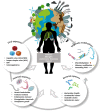Understanding Asthma and Allergies by the Lens of Biodiversity and Epigenetic Changes
- PMID: 33732246
- PMCID: PMC7957070
- DOI: 10.3389/fimmu.2021.623737
Understanding Asthma and Allergies by the Lens of Biodiversity and Epigenetic Changes
Abstract
Exposure to different organisms (bacteria, mold, virus, protozoan, helminths, among others) can induce epigenetic changes affecting the modulation of immune responses and consequently increasing the susceptibility to inflammatory diseases. Epigenomic regulatory features are highly affected during embryonic development and are responsible for the expression or repression of different genes associated with cell development and targeting/conducting immune responses. The well-known, "window of opportunity" that includes maternal and post-natal environmental exposures, which include maternal infections, microbiota, diet, drugs, and pollutant exposures are of fundamental importance to immune modulation and these events are almost always accompanied by epigenetic changes. Recently, it has been shown that these alterations could be involved in both risk and protection of allergic diseases through mechanisms, such as DNA methylation and histone modifications, which can enhance Th2 responses and maintain memory Th2 cells or decrease Treg cells differentiation. In addition, epigenetic changes may differ according to the microbial agent involved and may even influence different asthma or allergy phenotypes. In this review, we discuss how exposure to different organisms, including bacteria, viruses, and helminths can lead to epigenetic modulations and how this correlates with allergic diseases considering different genetic backgrounds of several ancestral populations.
Keywords: allergies; asthma; epigenetics; holobiont; microbiome.
Copyright © 2021 Fiuza, Fonseca, Meirelles, Marques, da Silva and Figueiredo.
Conflict of interest statement
The authors declare that the research was conducted in the absence of any commercial or financial relationships that could be construed as a potential conflict of interest.
Figures

References
Publication types
MeSH terms
LinkOut - more resources
Full Text Sources
Other Literature Sources
Medical

